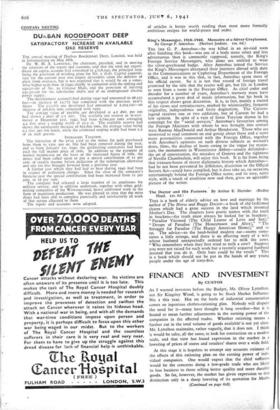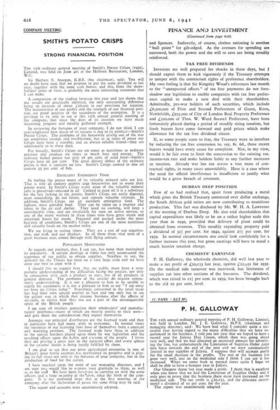FINANCE AND INVESTMENT
By CUSTOS As I warned investors before the Budget, Mr. Oliver Lyttelton, not Sir Kingsley Wood, is going to be Stock Market Influence No. 1 this year. Hot on the heels of industrial concentration comes an ingenious clothes-rationing plan. Nobody will dispute the need for it—many have thought it long overdue—but it is bound to mean further adjustments in the earning power of the companies in the affected trades. Whether rationing means a further cut in the total volume of goods available' is not yet clear. Mr. Lyttelton maintains, rather vaguely, that it does not. I think it would be safer, all the same, to look for contraction on a modest scale, and that view has found expression in the market in a lowering of prices of stores and retailers' shares over a wide field.
At this stage it is hopeless to attempt any accurate estimate of the effects of this rationing plan on the earning power of indi- vidual companies. One would expect that the chief sufferers would be the concerns doing a low-grade trade who are likely to lose business to those selling better quality and more durable goods. So far, however, the market has given expression to this distinction only in a sharp lowering of its quotation for Marks
(Continued on page 618)
FINANCE AND INVESTMENT
(Continued from page 616) and Spencer. Indirectly, of course, clothes rationing is another " bull point " for gilt-edged. As the avenues for spending are narrowed, both the power and the will to save are being steadily reinforced.
TAX FREE DIVIDENDS
Investors are well prepared for shocks in these days, but I should expect them to kick vigorously if the Treasury attempts to tamper with the contractual rights of preference shareholders. My own feeling is that Sir Kingsley Wood's references last month to the " unexpected effects " of tax free payments do not fore- shadow any legislation to enable companies with tax free prefer- ence capital to make a new deal with their shareholders. Admittedly, pre-war holders of such securities, which include £6,500,000 of First and Second Preferences of Guest, Keen, Nettlefolds, £935,000 of City of London Real Property Preference and £500,00o of Thos. W. Ward Second Preference, have been fortunately placed during a period of steadily rising taxation, but fresh buyers have come forward and paid prices which make allowance for the tax free dividend clause.
If, as some people seem to fear, the Treasury were to interfere by reducing the tax free concession to, say, 8s. 6d., these recent buyers would have every cause for complaint. Nor, in my view, would it be fair even to limit the concession to the existing los. income-tax rate and make holders liable to any further increases m taxation. Already war has cut across a vast mass of con- tractual rights, in many cases unavoidably. Here is a case where the need for official interference is insufficient to justify what would be a gross breach of covenant.
DURBAN DEEP POSITION
Few of us had realised that, apart from producing a metal which gives the British Treasury command over dollar exchange, the South African gold mines are now contributing to munitions production. This fact was disclosed by Mr. W. H. A. Lawrence at the meeting of Durban Deep. He also told shareholders that capital expenditure was likely to be on a rather higher scale this year than in 1940, provided that delivery of plant could be obtained from overseas. This steadily expanding property paid a dividend of 32f per cent. for 1940, against 271 per cent, for 1939. In normal circumstances one could look confidently for a further increase this year, but gross earnings will have to stand a much heavier taxation charge.
CHEMISTS' EARNINGS
P. H. Galloway, the wholesale chemists, did well last year to make a net profit of £20,133 last year, against £22,551 for 1939. On the medical side turnover was increased, but limitation of supplies cut into other sections of the business. The dividend, which was raised to rf per cent. in 1939, has been brought back to the old to per cent. level.



























 Previous page
Previous page